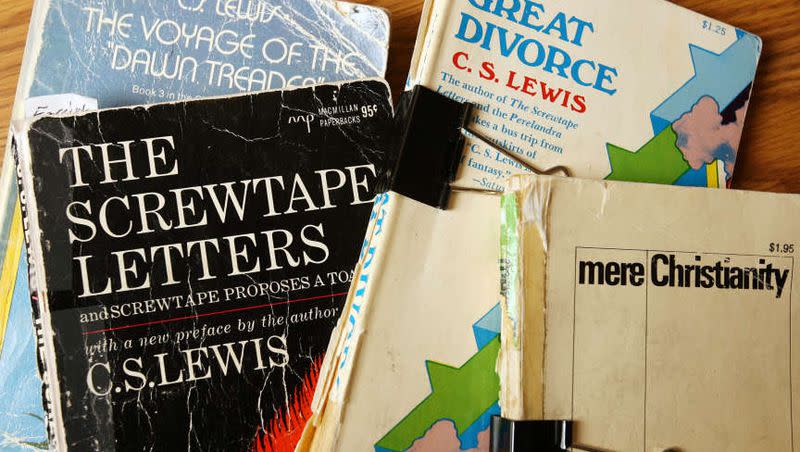What the last day of C.S. Lewis’s life was like, 60 years ago today

- Oops!Something went wrong.Please try again later.
- Oops!Something went wrong.Please try again later.
Although C.S. Lewis was famous when he was alive, the death of the beloved Christian apologist and author from renal failure went largely overlooked because of something else that happened the same day.
Lewis died around 5:30 p.m. at his home in Oxford, England, The Kilns. Adjusting for the time zones, this was an hour before John F. Kennedy was shot in Dallas, Texas. The U.S. president was pronounced dead a half-hour later.
Lewis was 64 when he died, a week before his birthday. Kennedy was 46.
Lewis’ stepson, Douglas Gresham, would later recall that he learned about Kennedy’s death before that of his stepfather. (Lewis married Gresham’s mother, Joy Davidman, in 1956; she would die of cancer four years later, inspiring Lewis to write “A Grief Observed.”)
In a 2013 interview with the U.K.’s Independent, Gresham said that, because Lewis’ brother was so devastated by the loss, the stepson had worked with Walter Hooper to issue a news release about Lewis’ death the next day, and only two news outlets reached out about the news. The New York Times announced the death Nov. 24.
“People only very slowly became aware of Jack’s death,” Gresham said. “For years afterwards, his estate would forward letters to me that were still addressed to him.”
While largely unheralded, Lewis’ death was not entirely unexpected. He had been in declining health for a few years and had resigned from his position at Cambridge University in August 1963. His kidneys were failing, and treatment at that time largely consisted of blood transfusions; dialysis did not become common until the 1970s. In a July hospitalization, he came so close to death that he received the Roman Catholic last rites.
Correspondence in the last months of Lewis’ life showed that he didn’t expect to live much longer. He signed one letter, sent in June, “a tired traveller near the journey’s end.”
Related
How J.R.R. Tolkien’s friendship led C.S. Lewis to become a Christian
C.S. Lewis had a different take on Christmas. Here’s what he had to say
His last months were spent at home, in a room set up on the first floor, as he could no longer ascend the stairs to his bedroom and study. He was cared for, first by a nurse, and then by his brother, Warnie.
According to an article on the blog of The Gospel Coalition, among his final correspondents was a young woman by the name of Kathy Kristy, who would later go on to marry the renowned pastor Tim Keller, who died earlier this year.
In his last week of life, he met with his friend J.R.R. Tolkien and Tolkien’s son. (After Lewis’ death, Tolkien would say, “So far I have felt the normal feelings of a man my age — like an old tree that is losing all its leaves one by one: this feels like an axe-blow near the roots.”)
Lewis also worked on an essay that would be published the next month in the Saturday Evening Post, entitled, “We have no right to happiness.”
There is not much known of his last day, other than that he had a quiet morning at home with his brother, and took a nap in the afternoon. His brother later said that he took tea to Lewis in bed around 4 p.m., and then rushed to his brother’s side when he heard him collapse on the floor about 90 minutes later. Lewis was unconscious when his brother found him; he died a few minutes later. It’s unknown what his last words were.
But we do know what Lewis thought about death generally, because of his famous “argument from desire,” in which he said, “If I find in myself a desire which no experience in this world can satisfy, the most probable explanation is that I was made for another world.”
“The fact that our heart yearns for something earth can’t supply is proof that heaven must be our home.”
60 years ago today, C. S. Lewis made it home. pic.twitter.com/xYx9LTR4jV— Matt Smethurst (@MattSmethurst) November 22, 2023

